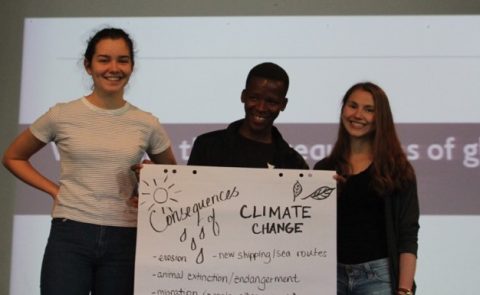
 The campus was particularly lush and green today; a perfect day to study the environment. We started off breakfast with a particularly ambitious student-made fruit salad—with apples, peaches, mangoes, bananas, and grapes. One of the best things about Swaziland is the fruit. It’s plentiful, widely available, and brimming with sweetness. Nectarines, plums, mangoes, bananas, peaches…the list goes on!
The campus was particularly lush and green today; a perfect day to study the environment. We started off breakfast with a particularly ambitious student-made fruit salad—with apples, peaches, mangoes, bananas, and grapes. One of the best things about Swaziland is the fruit. It’s plentiful, widely available, and brimming with sweetness. Nectarines, plums, mangoes, bananas, peaches…the list goes on!
Our morning session covered an introduction to climate change—historic trends in carbon dioxide emissions, the implications, and the urgency of immediate action. We started measuring our own carbon footprint, calculating the cost of using a cell phone, or buying a year’s worth of clothes. We then renewed the human barometer, creating an agree-disagree scale to compare opinions on statements like:
 The afternoon’s session focused on climate justice, refugees, and the question of who should bear responsibility for reducing CO2 emissions. We did a debate, featuring the relevant stakeholders—the US, developing countries, island states, industry, climate refugees, and climate activists—and discovered just how difficult it is to reach an agreement. One group saw the US boycott the proceedings altogether, and another could only agree on very watered-down language.
The afternoon’s session focused on climate justice, refugees, and the question of who should bear responsibility for reducing CO2 emissions. We did a debate, featuring the relevant stakeholders—the US, developing countries, island states, industry, climate refugees, and climate activists—and discovered just how difficult it is to reach an agreement. One group saw the US boycott the proceedings altogether, and another could only agree on very watered-down language.
We ended the day with some boardgames specifically designed to demonstrate the challenges of reducing emissions in daily life—at home, in lifestyle, and in production.
Tomorrow we take a more practical approach to the environment and head off-campus again, this time to enjoy a hike in at the Malalotcha nature reserve.